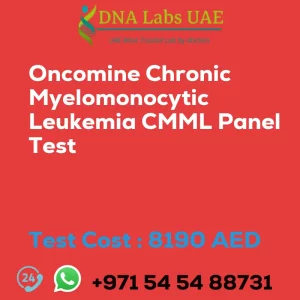Cancer Breast Comprehensive Panel Test
Test Name: Cancer Breast Comprehensive Panel Test
Test Components:
- IHC ERBB2 (HER-2) with reflex to FISH
- ER
- PR
- Ki67
Price: 1640.0 AED
Sample Condition: Submit tumor tissue in 10% Formalin OR Formalin fixed paraffin embedded tissue block. Ship at room temperature. Provide a copy of the Histopathology report, clinical history & indicate site of biopsy.
Report Delivery: Sample due by Tuesday 9 am; Report available in 10 working days
Method: Immunohistochemistry, FISH
Test Type: Breast Cancer
Doctor: Oncologist
Test Department: Cytogenetics
Pre Test Information: Provide a copy of the Histopathology report, clinical history & indicate site of biopsy.
Test Details:
The Cancer Breast Comprehensive Panel test is a diagnostic test used to assess the risk of breast cancer in individuals. It analyzes multiple genes associated with breast cancer to identify any genetic mutations or variations that may increase the risk of developing the disease.
The test typically includes the analysis of genes such as BRCA1 and BRCA2, which are known to be associated with an increased risk of breast and ovarian cancers. Other genes that may be included in the panel depend on the specific laboratory conducting the test.
The test is usually recommended for individuals with a personal or family history of breast cancer, especially if they have multiple relatives affected by the disease or if the cancer occurred at an early age. It can also be used to determine the likelihood of developing breast cancer in individuals who have already been diagnosed with the disease.
The Cancer Breast Comprehensive Panel test is typically performed using a blood sample or a saliva sample, which is then sent to a specialized laboratory for analysis. The results of the test can help individuals and their healthcare providers make informed decisions about their healthcare, such as considering preventive measures or personalized treatment options.
It’s important to note that the test does not provide a definitive diagnosis of breast cancer, but rather assesses the risk of developing the disease based on genetic factors. It is usually used in conjunction with other diagnostic tools and medical evaluations to provide a comprehensive assessment of an individual’s breast cancer risk.
| Test Name | CANCER BREAST COMPREHENSIVE PANEL Test |
|---|---|
| Components | *IHC ERBB2 (HER-2) with reflex to FISH*ER *PR*Ki67 |
| Price | 1640.0 AED |
| Sample Condition | Submit tumor tissue in 10% Formalin OR Formalin fixed paraffin embedded tissue block. Ship at room temperature. Provide a copy of the Histopathologyreport,clinical history & indicate site of biopsy. |
| Report Delivery | SampleTue by 9 am; Report 10 Working days |
| Method | Immunohistochemistry, FISH |
| Test type | Breast Cancer |
| Doctor | Oncologist |
| Test Department: | CYTOGENETICS |
| Pre Test Information | Provide a copy of the Histopathologyreport,clinical history & indicate site of biopsy. |
| Test Details |
The Cancer Breast Comprehensive Panel test is a diagnostic test used to assess the risk of breast cancer in individuals. It analyzes multiple genes associated with breast cancer to identify any genetic mutations or variations that may increase the risk of developing the disease. The test typically includes the analysis of genes such as BRCA1 and BRCA2, which are known to be associated with an increased risk of breast and ovarian cancers. Other genes that may be included in the panel depend on the specific laboratory conducting the test. The test is usually recommended for individuals with a personal or family history of breast cancer, especially if they have multiple relatives affected by the disease or if the cancer occurred at an early age. It can also be used to determine the likelihood of developing breast cancer in individuals who have already been diagnosed with the disease. The Cancer Breast Comprehensive Panel test is typically performed using a blood sample or a saliva sample, which is then sent to a specialized laboratory for analysis. The results of the test can help individuals and their healthcare providers make informed decisions about their healthcare, such as considering preventive measures or personalized treatment options. It’s important to note that the test does not provide a definitive diagnosis of breast cancer, but rather assesses the risk of developing the disease based on genetic factors. It is usually used in conjunction with other diagnostic tools and medical evaluations to provide a comprehensive assessment of an individual’s breast cancer risk. |








